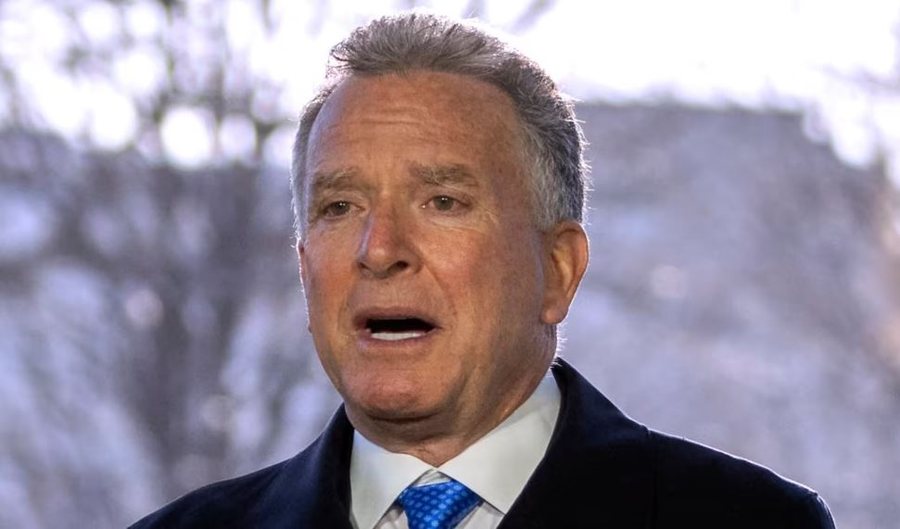
A top aide to US President Donald Trump has arrived in Russia amid a diplomatic storm over the war in Ukraine, including US-Ukraine talks in Washington and a meeting led by Britain and Germany in Brussels.
Kremlin spokesman Dmitry Peskov told Russian state media that U.S. special envoy Steve Witkoff had arrived on April 11. He stopped in St. Petersburg on his way to high-level talks with Tehran on Iran's nuclear program. The U.S.-Iran talks are scheduled to take place in Oman on April 12.
Peskov, according to state media, said Trump's envoy would meet with Russian President Vladimir Putin to discuss aspects of the Ukraine peace talks. He did not say whether the meeting would also discuss Iran or any other topic.
Russian state news agency TASS reported that Witkoff met with Kirill Dmitriev, a figure with strong Kremlin ties and head of the Russian Direct Investment Fund, upon his arrival in Russia. Last week, the two officials met in Washington, where they discussed strengthening bilateral relations.
Witkoff's visit comes a day after US and Russian officials met in Istanbul to discuss normalizing diplomatic relations, which could lead to the return of embassy staff who were expelled since the Russian occupation of Ukraine began in 2022.
This is Witkoff's third visit to Russia since Trump took office in January, promising improved relations with Moscow.
Last month, his meeting with Putin paved the way for a phone call between the two presidents. He also visited Russia in February and was part of the US-Russia talks in Riyadh.
Who is Steve Witkoff?
Witkoff is a New York real estate developer and Trump friend with no prior diplomatic experience, which has raised concerns in some quarters about his leading role in such sensitive talks.
“The fact that he doesn’t have the context and the history of how the Russians negotiate with the Americans is, in my opinion, problematic,” said David Kramer, who held a senior position at the State Department during the George W. Bush administration.
"Putin says nice things to him, gives him a portrait of the president, talks about going to church and praying for his friend [Trump]," Kramer told Radio Free Europe on April 10.
"Those are old KGB tactics. And I think Witkoff doesn't have enough awareness to understand what's going on there."
Trump has praised Witkoff. In January, he called him "a great negotiator... a great dealmaker."
The purpose of Witkoff's visit is to push forward stalled U.S. efforts to broker a ceasefire between Russia and Ukraine. Trump has recently expressed frustration with both sides over the lack of progress.
Trump criticized Russia for intensifying its air campaign against Ukraine and said Ukrainian President Volodymyr Zelensky was "trying to back out" of a deal that gives Washington access to rare earth mineral deposits in Ukraine.
A Ukrainian delegation is expected to hold talks on this agreement in Washington later on April 11.
Turkey promises mission in the Black Sea
Meanwhile, in Brussels, progress has been made on forming a European-led military force to deploy to Ukraine in the event of a ceasefire or peace agreement.
Two European diplomatic sources told Radio Free Europe that Turkey has expressed its readiness to "take responsibility for the maritime dimension of the mission."
This was done during a meeting of the "coalition of the willing" on April 10.
So far, only Britain and France have publicly pledged to send troops, although other countries have expressed openness depending on the circumstances of the deployment.
On April 11, Britain and Germany chaired a meeting of the Ukraine Defense Contact Group in Brussels, which coordinates military assistance to Ukraine.
This group was created in 2022 and was chaired by former US Secretary of Defense Lloyd Austin. His successor, Pete Hegseth, has remained more in the shadows and participated in this meeting via video link.
German Defense Minister Boris Pistorius said Hegseth gave "interesting and accurate assessments" in his speech.
Ahead of the meetings, European countries had pledged new support for Ukraine in the months and years ahead.
Britain and Norway announced a joint package for military drones, radar systems and anti-tank mines.
Germany and the Netherlands announced they would provide additional air and missile defense systems.
"This will have an impact on the battlefield this year," Pistorius said./ REL (A2 Televizion)











